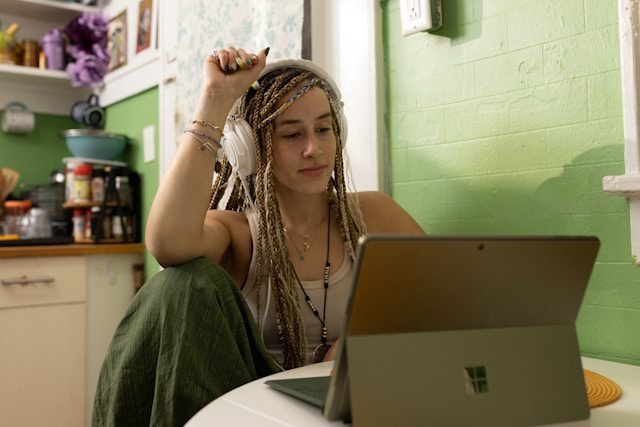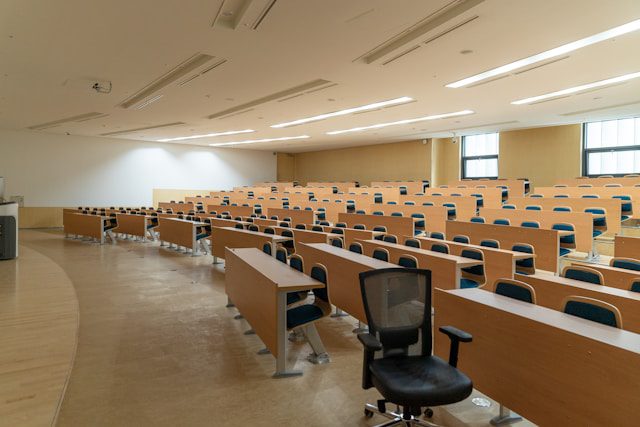Once a student has a thorough understanding of the Dubai student visa requirements, costs, and process for obtaining a student visa, they can successfully apply and study in UAE. Dubai is called the Education Hub since it offers domestic and international students access to all educational resources.
Dubai is also known as the “CITY OF GOLD.” It is one of the biggest nations in the United Arab Emirates and has a robust economy, with the gold trade accounting for a sizable portion of its GDP.
Universities and colleges in this area genuinely care about education. The international student community on campus encourages students to learn and explore as they come from all over the world for higher education.
On several campuses in Dubai, international students can take courses in Science, Engineering and Technology, Architecture, Aviation, Management, Business, Economics, Media and Mass, Computers and IT, Law, Natural Sciences, and other subjects.
These initiatives also increase the number of job opportunities. Students who complete the programme are awarded a degree that the UAE Ministry of Higher Education recognises. Their degrees are well-known and respected around the world.
Why Attend University in Dubai as an International Student?
Beyond its glitz, Dubai is renowned for its academic prowess and the ease with which international students can apply for a student visa if they meet the Dubai student visa requirements.

Universities do a great job of preparing their students for life after graduation and the working world. The following justifies studying in Dubai for students:
1. Well-Developed Educational System
The UAE’s educational system, especially Dubai’s, is well-known for its excellence and variety. To meet their students’ academic interests and professional goals, universities in Dubai provide a diverse array of programmes and courses in various subjects.
Whatever your field of interest is be it business, engineering, humanities, or technology, Dubai’s universities offer all-encompassing education that satisfies international requirements.
2. Modern Infrastructure
Dubai’s universities are equipped with cutting-edge infrastructure and amenities to improve students’ educational experiences. Students can take advantage of state-of-the-art facilities such as well-equipped classrooms, libraries, and research centres, all of which help their academic endeavours. Furthermore, a lot of colleges work with business partners to provide internships and hands-on training so that students can get experience in the subjects they choose to pursue. These opportunities often require a valid Emirates ID and, sometimes, visa sponsorship.
3. Safety and Security
Dubai is one of the safest cities in the world because of its strict security measures and remarkably low crime rates.
Students studying in Dubai can feel safe and protected both on and off campus. Because of the city’s dedication to safety, students may concentrate on their education and personal development without having to worry about their safety.
Dubai offers a secure and friendly atmosphere for students from various backgrounds, whether participating in extracurricular activities or just enjoying the city’s rich culture. Moreover, applying for a Dubai student visa and securing an Emirates ID card are straightforward processes that further enhance the international student’s experience.
4. Employment Prospects
Graduates have a good chance of finding work in Dubai because to its strong economy and developing labour market. Dubai is home to numerous international corporations and global organisations that offer graduates a wide range of job possibilities and opportunities for advancement.

Furthermore, the city’s standing as a worldwide centre of commerce encourages innovation and entrepreneurship, giving students the chance to start their own businesses or work in developing fields. A full-time job is possible because of the significant advancements in trade, commerce, and infrastructure.
5. Lower living expenses and tuition rates
Despite being a cosmopolitan metropolis and a worldwide centre, Dubai offers comparatively cheaper living costs when compared to other major global cities.
Although the cost of living might vary based on personal preferences and lifestyle decisions, students frequently discover that everyday expenses, transportation, and lodging are more reasonably priced in Dubai.
This relieves students of the weight of undue financial hardship and enables them to handle their money more skillfully while concentrating on their education.
UAE Student Visa Documents (Dubai Student Visa Requirements)
International students can choose from various universities and colleges, but they must fulfil the admissions standards. If a student is not a citizen of the United Arab Emirates or does not come from one of the five GCC nations: Bahrain, Kuwait, Oman, Qatar, or Saudi Arabia, they must obtain a study visa to study in Dubai.

Before receiving a student visa, students need to fulfil all university requirements. The following paperwork is required to apply for a student visa to Dubai:
- A passport that is up-to-date
- Twelve recent passport-sized photos against a white backdrop.
- The admissions offer letter that the UAE university sent.
- A student bank statement is needed to confirm the amount of money.
- A lease. If a student plans to live in university housing and doesn’t have any, he needs to obtain a letter from the institution.
- A copy of the study program’s current year’s tuition fee receipt.
- A copy of the receipt for the visa cost for the academic year currently underway
- Postgraduate students must provide documentation of their undergraduate education.
- When the student arrives in Dubai, he must have a medical examination from an approved facility. A medical examination and a chest X-ray are typically included in the test for tuberculosis, leprosy, syphilis, hepatitis C, hepatitis B, and HIV. Except for syphilis, which is treatable, the student will be deported if any of these test results are positive.
How to Apply for a Dubai Study Visa in 2024 (UAE Student Visa Application Process)
1. Do your thorough research
Determine what you want to study, where you want to live, how much everything will cost, and other factors before enrolling in a university or school in Dubai.
2. Get ready
Depending on the prerequisites of the university or institute of your choice, be prepared for entrance exams and take standardised tests like the TOEFL or IELTS.

3. Fund your education
Ensure you have enough income documentation to sustain you during your time in Dubai. This covers education, lodging, transportation, meals, and other related expenses.
4. University Application
Apply to the chosen university. In addition to the ones listed above, your chosen university or institution in Dubai may have additional admission requirements. After fulfilling the required prerequisites, proceed with the application process.
5. Verify that your Admission
Your selected institution or institute will send you a letter of acceptance confirmation once you’ve satisfied the prerequisites. Paying the necessary fees is the next step.
6. Apply for a Dubai Study Visa (UAE Student Visa)
Once you have the acceptance letter, you can apply for a student visa to study in Dubai. A Dubai student visa takes ten to fifteen business days to process.
Note:
UAE universities usually facilitate overseas students’ UAE student visas themselves. Students can send documents directly to the institution.
The institution will start the visa application procedure as soon as it sends you the offer letter for the programme and you accept it.
Study Visa Advantages
1. Global Centre
International students studying in Dubai will benefit from rich student life experiences and gain credentials for their resumes. As you know, Dubai is renowned for its skyscrapers and architecture, as well as for travel and hospitality. However, the city also offers fantastic opportunities for leisure travel. Your stay as a student in Dubai will be unforgettable.
Throughout your visit to Dubai, you can take advantage of everything from the job fairs to the Dubai retail extravaganza. With the help of a top-notch higher education provider, you will study abroad in Dubai and have a good life every day. You will have access to first-rate facilities as an international student studying in Dubai.
2. A Variety of Career Paths
You will have countless options and better professional prospects if you study abroad in Dubai. Since Dubai’s economy is among the fastest-growing globally, you can explore the city and establish a prosperous career there. If you want to take courses specifically focused on the sector and advance your career, you should study abroad in Dubai.
You can utilise the qualifications you will receive from Dubai for your international work chances or further education. Dubai’s degree and diploma programmes are respected globally, making it simpler to broaden your professional horizons.
3. The Policy of Easy Admission
Would you like to pursue a master’s degree or a bachelor’s? Alternatively, are you a professional seeking to advance your career and obtain a certification or qualification in your field? Dubai study abroad programmes might be the best choice for all your academic requirements. The simple admissions requirements that educational institutions maintain and enforce are one of the main advantages of studying in Dubai.

In Dubai, you can join any degree you want to take without usually needing to receive good marks on competitive exams. Unlike other foreign nations, Dubai offers easier admissions requirements and policies if you decide to study abroad.
4. Various Course Choices
As was previously said, you can pursue any level course in Dubai. If you’re wondering what and why you should study in Dubai, know that you may find any degree you want to pursue in the city, be it a bachelor’s, master’s, diploma, or certification. You can pursue a degree or a Higher National Diploma (HND) in Dubai. You have the option to study courses in one or more of the following fields:
- Management and Business
- Finance and Accounting
- Financial Services Education Technology
- Building Administration
5. Opportunities for Part-Time Work
Did you know that you can work and study in Dubai at the same time? Indeed! Yes, you read it correctly! In addition to learning in Dubai, you can take a part-time job. In Dubai, working 15 hours a week during the school year and 40 hours a week during breaks and holidays is permitted. Internships in Dubai are an additional option for overseas students. Select the option that best fits and comforts you. You have a choice of part-time jobs that are available on or off campus.
6. Scholarships Are Available
This should ease your concerns if you wish to study in Dubai but are concerned about your financial situation. In Dubai, numerous colleges and other educational establishments provide scholarships worth up to 50% for study abroad.
If you fit the requirements and qualify, you can apply for these scholarships and pay for your further education at a reasonable cost.
Cost of a Dubai Study Visa
International students seeking a study visa to Dubai require the following payments. The fees may change according to the university, programme, and kind of application, but the Dubai student visa fees listed below are necessary.
- Processing fees for visas: from 2300 to 2700 AED
- Refundable visa deposit: from 2,500 to 3,000 AED
- Costs of medical insurance: 1,300–1,400 AED
Dubai Study Visa Processing Time
The processing time for a Dubai student visa is roughly ten to fifteen working days, after which the student entry permit is sent to the university of your choice.

The student entry permit has a two-month validity period and must be used to enter the nation by the date on the visa.
Dubai Study Visa Types
There are three categories for Dubai Study Visas:
- Study Visa for Dubai Sponsored by Family: International students studying full-time in academic institutions may be qualified to apply for a UAE study visa through parental sponsorship.
- Sponsored Study Visa: If the educational institution meets the requirements, full-time international students can get sponsorship from the organisation.
- Short-Term Study Visa: International students who intend to study in Dubai for a few months may be able to apply for a short-term study visa.
How to Get Permanent Residency After Study
Students’ lives are drastically altered by work after studying in the United Arab Emirates, particularly after completing top-notch programmes like an MBA in Dubai, since they must leave the student zone and live independently. They must work off-campus for businesses and have an employment visa; if they are discovered to be working while on a student visa, they will be released.

Obtaining a work visa is now just one step away after landing a full-time job in the UAE. Students must get a post-study work visa to work in the UAE after receiving their graduate degree.
Students in the UAE have a wide range of post-study employment possibilities nationwide. Below are some of the most well-liked job profiles open to students looking for post-study jobs.
UAE’s High-Demanding Skill Set
The UAE will need the following talents the most in 2022. If you want to improve your chances of getting employed, you might want to start working on these skills:
- Financial Analyst: The financial industry in the UAE is home to a large number of in-demand positions. As a result, you will be valuable to many businesses if you have extensive financial expertise. There are several job prospects in finance for students.
- Social Media Marketing: This marketing expertise will enable you to work as an SMM in the United Arab Emirates. If you have experience with and understanding of social media algorithms, you can quickly find better employment in this field.
- Engineering: Students with a background in engineering have a wide range of career options. Whether you are an expert in computer engineering, mechanical engineering, or any other field is irrelevant.
- Web development: In the United Arab Emirates, one of the highest-paying jobs is web development. There are lots of work options if you are confident in your skills to design websites and apps.
- Nursing: Since the COVID-19 pandemic, nursing has been one of the most demanding medical specialties in the United Arab Emirates. In the UAE, a nursing degree opens doors to well-paying employment.
UAE Work Permit Application Process
Most overseas students want to work in the UAE after earning their degree to pay for their education in this wealthy nation. The procedures for obtaining a work visa for the United Arab Emirates are listed below.
- Step 1: Students must have a current job offer letter from a UAE-based employer to apply for an employment visa. The employment visa application process is started on your behalf by employers when they issue you a confirmation letter.
- Step 2: Now, bide your time until your employers file the required forms to obtain a work permit in the Gulf. Note that the employment visa fee is paid by employers, not by you.
- Step 3: To obtain your UAE health card, you must now provide the Department of Health and Medical Services with your medical examination reports, copies of your passport, two passport-size photos, a written work offer, and a visa application.
- Step 4: To work full-time in the UAE, provide all required documentation to the Ministry of Labour office after obtaining the UAE health card.
- Step 5: If you intend to work in the nation for an extended period, you must apply for a residence visa. Before entering the country, confirm that your passport is valid for at least six months.
Best Universities in UAE
1. United Arab Emirates University
United Arab Emirates University, ranked 284th in the world, is the oldest university in the nation despite being relatively new and founded in 1976. It is located in the city of Al Ain in the emirate of Abu Dhabi. Numerous influential figures in business and politics are among its alums.
2. American University of Sharjah
According to global rankings, the American University of Sharjah (AUS) is tied for 348th place. With licences from the US and the UAE, AUS is a well-liked option for international students, resulting in a diversified student body. It provides courses based on the US model of higher education. It is situated in Sharjah, a city added to the QS Best Student Cities list in 2016.

3. Khalifa University
As a result of a government effort, the non-profit institution with a science concentration, Khalifa Institution, was established in Abu Dhabi in 2007. Approximately 1,500 students are taught there, but plans for a larger campus could allow 6,000 students to attend.
To promote research and innovation in the United Arab Emirates and the surrounding area, the university is building a global network of collaborators, faculty members, and research initiatives based on the framework of American higher education.
4. University of Sharjah
The University of Sharjah was founded in 1997 by Sultan bin Muhammad Al-Qasimi, the Emir of Sharjah, and is ranked 601-650 in the QS World University Rankings.
The university contributes significantly to the socioeconomic growth of the Sharjah emirate and strives to become a preeminent academic institution in the Middle East and worldwide.
5. Zayed University
Zayed University was founded in 1998 and currently enrols nearly 6,500 students, of whom 158 are international students.
Postgraduate tuition can reach US$30,000, while undergraduate prices typically fall between US$20,000 and US$22,000.
6. American University in Dubai (AUD)
Private American University in Dubai (AUD), ranked 601-650 in the world university rankings, was founded in 1995. There are about 2,585 enrolled students representing 108 different nationalities.
All of the university’s programmes are accredited by both the US and the UAE.
Frequently Asked Questions Studying in Dubai
1. How Much Is a Student Visa from Nigeria to Dubai?
The cost of a student visa from Nigeria to Dubai varies but generally includes the following payments:
- Processing fees for visas: from 2300 to 2700 AED
- Refundable visa deposit: from 2,500 to 3,000 AED
- Costs of medical insurance: 1,300–1,400 AED
It is important to note that these fees may change depending on factors such as the university, program, and type of application.
2. How Can I Get a Student Visa for Dubai?
To obtain a student visa for Dubai, you typically need to apply to a recognized educational institution in Dubai, receive an acceptance letter, and then apply for a student visa through the UAE immigration authorities or the institution’s designated visa processing center.

3. How Long Is a Student Visa in Dubai?
The duration of a student visa in Dubai may vary depending on factors such as the type of course or program.
Generally the processing time for a Dubai student visa is roughly ten to fifteen working days, after which the student entry permit is sent to the university of your choice.
4. Can You Work with a Student Visa in Dubai?
Only if you additionally secure a UAE Work Permit can you work in the UAE while on a student visa. Furthermore, you are only permitted to work four hours straight; you are not permitted to work full-time.
This is a very recent development, as up until recently, foreign students were only permitted to work during internships that their respective schools approved.
5. What Is Required for a Student Visa in Dubai?
Requirements for a student visa in Dubai may include an acceptance letter from a recognized educational institution, proof of financial resources, a valid passport, passport-sized photographs, medical certificates, and any other documents specified by the UAE immigration authorities.
6. How Much Bank Balance Is Required for a Dubai Student Visa?
The specific bank balance, which is usually part of Dubai student visa requirements may vary depending on factors such as tuition fees, living expenses, and the duration of the course.
It depends on the university. For instance, in the case of Abu Dhabi University, your sponsor’s bank account must have USD 15,000 as proof of funds.
Applicants typically need to demonstrate sufficient funds to cover their education and living costs.
7. Can I Work in Dubai with a Student Visa?
In most cases, students with a valid student visa in Dubai are not allowed to work unless they obtain additional authorization from the UAE Ministry of Human Resources and Emiratisation.
8. Can a Student Visa Allow Me to Work in the UAE?
Only if you additionally secure a UAE Work Permit can you work in the UAE while on a student visa. Furthermore, you are only permitted to work four hours straight; you are not permitted to work full-time.
This is a very recent development, as up until recently, international students were only permitted to work during internships that their respective schools approved.
9. If I already have a family visa and am in the UAE, do I still need a student visa?
You do, indeed. To pursue higher education at a college or university in the United Arab Emirates as a male above 18, you must get a Student Visa. This is because, as a boy, you are no longer eligible to remain on your parents’ visa after you become 18 years old.

Nevertheless, the UAE government introduced a new regulation in 2018 for the dependent sons of UAE visa holders.
According to the latest regulations, you can apply for a one-year UAE Residence Visa, which can be renewed after completing your secondary education or turning 18, whichever comes first.
As long as they are single, fathers can continue to sponsor their daughters at any age.
Final words
Due to Dubai’s thriving economy and position as a centre for education, students have easy access to top-notch universities and numerous opportunities for professional and personal development.
International students find Dubai appealing because of its contemporary infrastructure, emphasis on safety, and multicultural environment. Students can begin their educational adventure in Dubai by completing the required paperwork, financial requirements, and application processes.
This will provide a rewarding academic experience and bright future employment opportunities.


